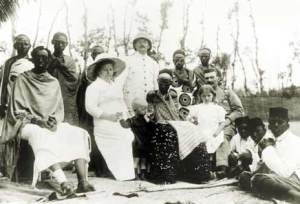Modern Ethnographic Responses to Colonialism: The Case of Post-Genocide Rwanda
“We did not choose to be colonized.” Photo taken from the Kigali Genocide Memorial Centre archives.
On Thursday, we’ll examine the legacies of colonial and “post-colonial” discourses for ethnographic research in post-genocide Rwanda. Drawing upon my own oral historical and ethnographic fieldwork encounters since 2007, we’ll discuss the impact of 19th and 20th century colonial discourses on Rwandan society leading up to the 1994 genocide, and their relevance for modern ethnographic research in post-genocide Rwanda. The readings include my 2011 article on “The Limits of Oral History: Ethics and Methodology Amid Highly Politicized Research Settings” and my 2012 fieldnote on “Conducting Fieldwork in Rwanda.” Additional recommended readings (both very brief) include Teju Cole’s “The White-Savior Industrial Complex” and Binyavanga Wainaina’s “How to write about Africa.”
Some possible questions for consideration include: how do past and present colonial discourses influence the practice of modern ethnography? What theoretical, ethical, and methodological considerations must we address in our efforts to work in post-colonial settings, particularly those recently affected by mass violence? And to what end? How do these considerations then shape the ethnographies we produce?
Finally, for those of you who are interested and have the spare time, I highly recommend taking 30 minutes to watch the 1986 mockumentary “Babakiueria.” It’s dated, but its criticisms of ethnography – however satirical – are as relevant today as they were in the past.


